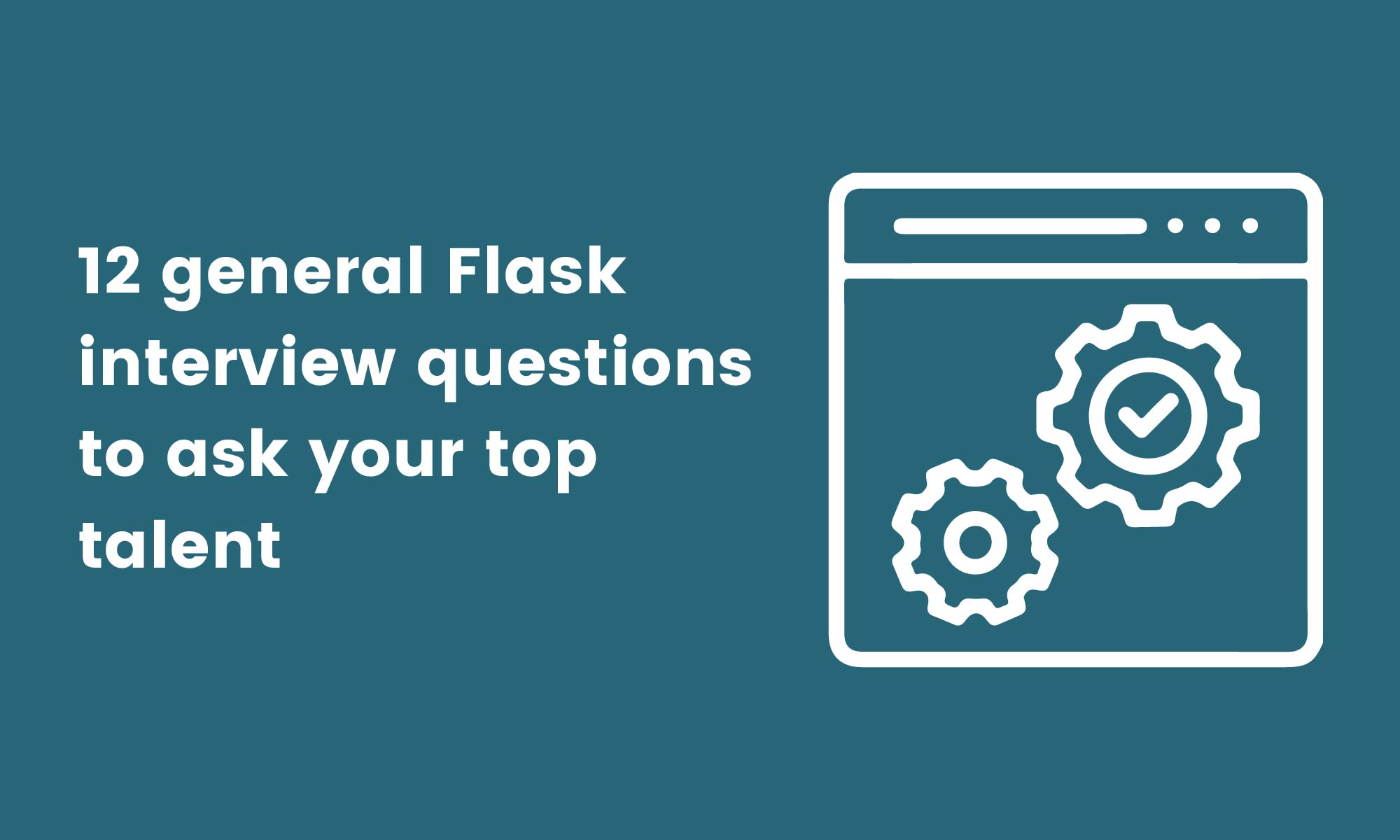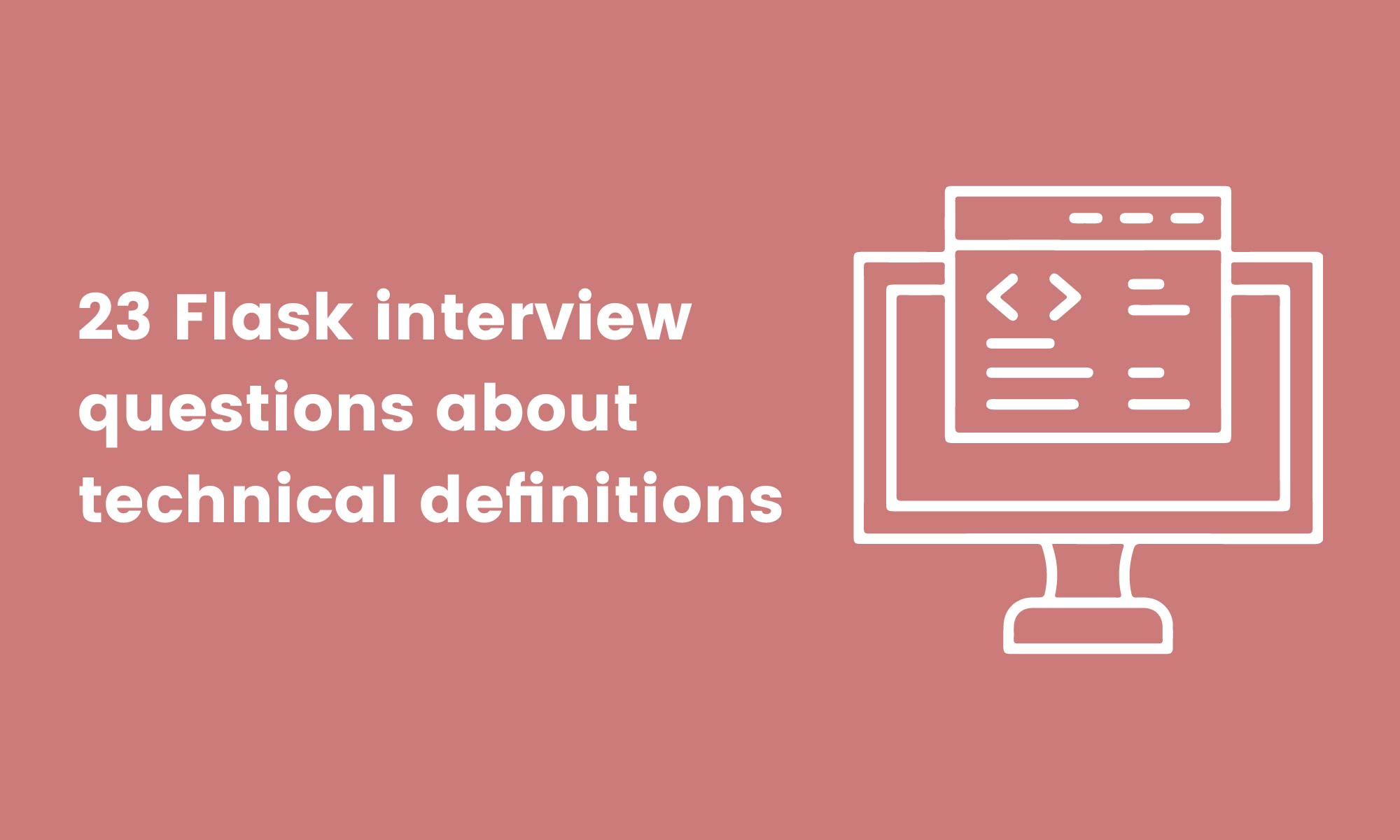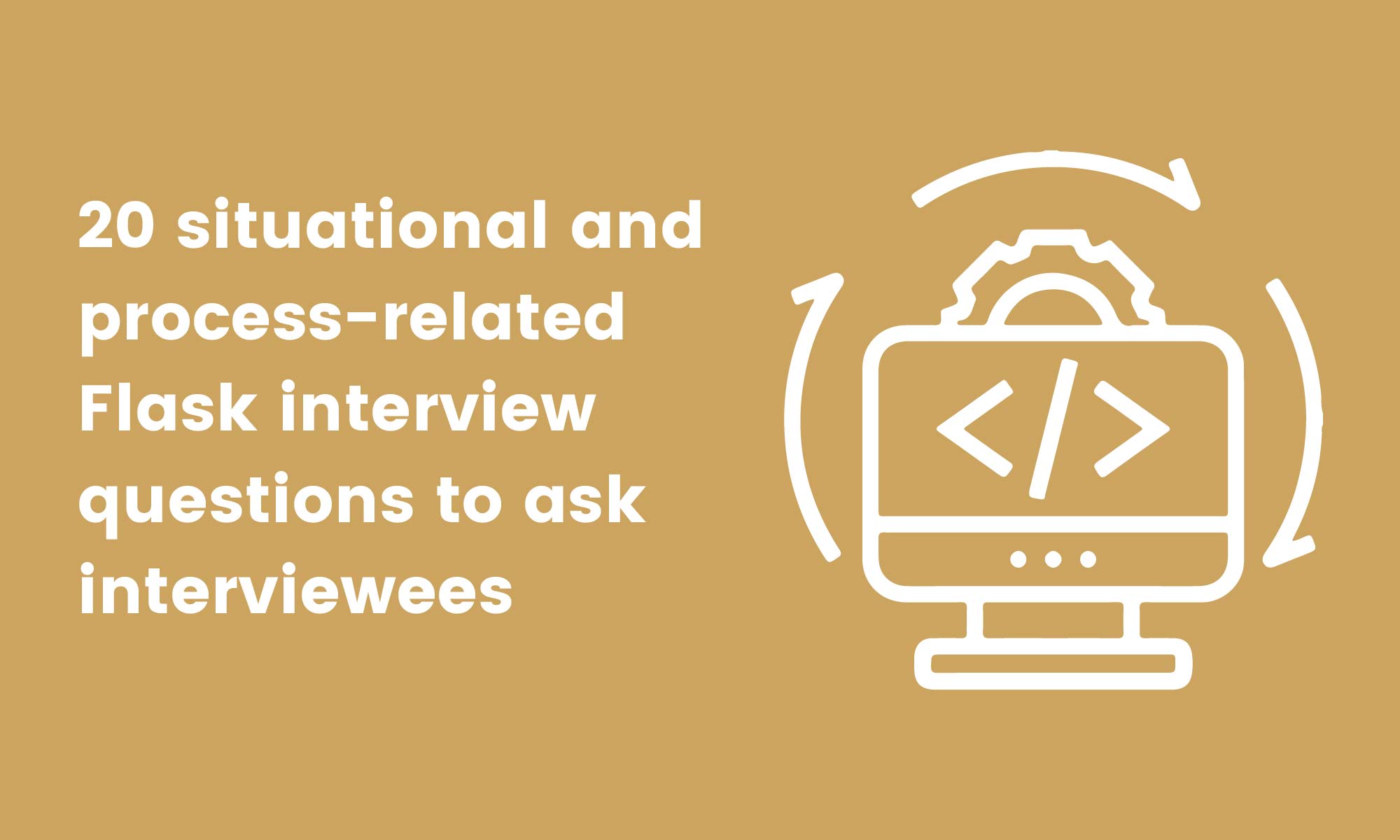55 Flask interview questions to weigh up your applicants’ skills
What’s the best way to evaluate your applicants’ Flask framework skills and knowledge? Is it reference checking? Resume screening? Or something else?
One of the fastest ways to evaluate abilities is by using a Flask skills test early on in the hiring process, in combination with other relevant tests. This enables you to identify top talent quickly and efficiently and shortlist your best candidates for an interview.
Interviewing is still an incredibly useful method to review applicants’ skills with the Flask framework, so having the right Flask interview questions at hand can be really helpful.
Here, we’ve prepared 55 Flask interview questions to help you cover all bases when interviewing your applicants.
Look at our questions below to put together your list.
Table of contents
- 12 general Flask interview questions to ask your top talent
- 5 general Flask interview questions and answers to review your candidates’ responses
- 23 Flask interview questions about technical definitions
- 5 Flask interview questions and answers about technical definitions
- 20 situational and process-related Flask interview questions to ask interviewees
- 5 situational and process-related Flask interview questions and answers
- 5 tips for using our Flask interview questions
- Appraise the best Flask developers using Flask interview questions
12 general Flask interview questions to ask your top talent
Include some of these 12 general Flask interview questions in your interviews to assess your applicants’ general Flask knowledge and experience.
Explain what Flask is.
Is the Flask framework open-source?
Explain what WSGI means.
What are the main uses of Flask?
Explain which host port is Flask’s default.
Explain which port is Flask’s default.
Can you explain why Flask is referred to as a micro-framework?
What are the advantages of using Flask? Name four.
Which Flask-related skills are you aiming to improve?
Which skills do developers need to use this framework successfully?
Which soft skills should developers try to hone when using the Flask framework?
Name the types of applications developers can create using Flask.
5 general Flask interview questions and answers to review your candidates’ responses
Here are the sample answers to five of the general Flask interview questions. Use them during or after interviews to evaluate your applicants’ responses.
1. Which soft skills should developers try to hone when using the Flask framework?
Ask your interviewees this interview question to determine whether they understand the importance of soft skills for developers. For example, candidates with sufficient experience should be able to explain why communication or critical thinking are vital skills for using the Flask framework successfully.
If you want to learn whether your applicants have these soft skills, you can use our comprehensive Communication and Critical-thinking tests to evaluate them.
2. Which Flask-related skills are you aiming to improve?
Even proficient developers must practice their Flask-related skills: Over time, they may lose the skills they haven’t used.
Candidates might give different answers to this question, based on their background and preferences. Some examples include Python and Git – but what’s most important is to see whether they’re motivated to improve their skills and also whether they’re taking specific steps to do this.
3. Name the types of applications developers can create using Flask.
There are plenty of applications developers can create using Flask. Your applicants should be able to name at least three. Some examples of Flask web applications include:
SAS apps
Static sites
Serverless applications
Single-page apps
Medium-sized websites
RESTful API apps
4. Is the Flask framework open-source?
If your developers have general knowledge of the Flask framework, they should know that it’s open-source. They may also add that Flask is a Python-based framework.
5. Can you explain why Flask is referred to as a micro-framework?
Since the Flask framework offers core features only, including blueprints and request routing, it is known as a micro-framework. Knowledgeable candidates will also know that Flask extensions allow developers to use other features like forms and caching.
The best insights on HR and recruitment, delivered to your inbox.
Biweekly updates. No spam. Unsubscribe any time.
23 Flask interview questions about technical definitions
Incorporate some of these 23 Flask interview questions about definitions and technical knowledge into your interviews to assess your next developer’s level of expertise.
Define template engines in Flask.
Define thread-local objects in Flask.
Explain how Django is different from Flask.
Explain how Pyramid is different from Flask.
Explain what the Flask-WTF extension does.
Explain what the G object is in Flask.
Are there any differences between the session and the G object in Flask?
Explain what the application context is in Flask.
Describe what the GET method does in Flask.
Describe what the HEAD method does in Flask.
Describe what the POST method does in Flask.
Describe what the PUT method does in Flask.
Describe what the DELETE method does in Flask.
Explain whether Flask counts as an MVC framework.
Explain what a decorator is in Flask.
What does the /b PDB command do?
What does the /c PDB command do?
What does the /s PDB command do?
What does the /n PDB command do?
What does the /l PDB command do?
What does the /p PDB command do?
Explain what pickling means.
Explain what unpickling means.
5 Flask interview questions and answers about technical definitions
Here are the sample answers to five of the Flask interview questions about definitions to help you evaluate your developers’ responses.
1. What does the /s PDB command do?
To test your candidates’ technical knowledge, ask them this Flask interview question. Your applicants should know that the /s PDB command is a function that will debug an application in Flask step by step.
2. What does the /b PDB command do?
Knowledgeable applicants will know that the /b PDB command will create breakpoints in a program’s execution when a developer has specified particular parameters.
3. What does the /n PDB command do?
Candidates should be aware that the /n PDB command will continue execution up until the program reaches the next line of the current function.
4. Describe what the PUT method does in Flask.
Applicants who understand the Flask framework will know that the PUT method will replace current data corresponding to target resources with uploaded content.
5. Describe what the DELETE method does in Flask.
Candidates who have top technical Flask framework knowledge will be able to explain that the DELETE method will remove the target resources’ current representations suggested by a URL.
20 situational and process-related Flask interview questions to ask interviewees
Integrate some of these 20 situational and process-related Flask interview questions into your recruitment process to evaluate how your candidates would respond to challenging situations.
Which method would you use to connect a database to Flask?
Explain how you would make a RESTful application through Flask.
Explain your strategy for debugging Flask applications.
Which method would you use to see all Flask commands?
Which method would you use to get an argument’s value in Flask?
Which method would you use to get the Flask user agent?
In which situation would you use the url_for function?
Explain how you would make an admin interface within Flask.
Explain how you would integrate a Facebook API into your Flask application.
What is required to use the SQLite database in Flask?
Which method would you use to alter Flask’s host port?
Explain which Flask extension you would use to build Ajax applications.
Which method would you use to install Flask on Linux?
Which method would you use to add a mailing feature to a Flask application?
Which method would you use to use a session in Flask?
Which method would you use to deploy a Flask application on Heroku?
Which approach would you use to log the request body in Flask?
Which approach would you use to make an array with checkboxes?
Are there any approaches you would use to get an HTTP header in Flask?
Name a method for serving static files in Flask.
5 situational and process-related Flask interview questions and answers
Here are the sample answers to five situational and process-related Flask interview questions to assess your candidates’ responses.
1. Explain how you would integrate a Facebook API into your Flask application.
The best way to integrate a Facebook API into a Flask application is by using the Flask social extension.
Candidates should know that this extension also works for other platforms like Twitter and should also be capable of explaining that developers can use it with the Flask security extension.
2. Explain how you would make an admin interface within Flask.
An ideal way to make an admin interface within Flask is to use the Flask admin extension. Candidates may explain that the extension will group views within classes.
They may also mention that the Flask app builder extension is another method to make an admin interface, explaining that this extension already has one.
3. Explain which Flask extension you would use to build Ajax applications.
One of the easiest ways to build Ajax applications is with the Flask Sijax extension (Sijax is short for Simple Ajax).
Applicants may explain that developers can use this library through PyPI, for which they simply need to install and configure it. After it has been initialized, they can then use the @flask_sijax decorator. This decorator will notify Ajax of the Flask application’s views.
4. Which method would you use to install Flask on Linux?
There’s a simple way to install Flask on Linux. Candidates may explain that developers can use a simple command to achieve this: the pip install Flask command. They may also explain that developers can use the Python package manager as part of this process.
5. Which method would you use to see all Flask commands?
A simple method for seeing all Flask commands is to use Flask –help. Applicants should know that when developers enter this into the command line, they will see every option and default command.
5 tips for using our Flask interview questions
We’ve lined up five tips to help you make the most of our interview questions. Check out our advice below:
1. Use skills tests to assess applicants’ Flask and programming skills before the interview
Skills tests enable you to assess your applicants’ programming skills and Flask knowledge with ease. You can combine up to five tests in a single assessment for an in-depth evaluation of your candidates’ abilities.
For instance, if you want to find out whether applicants are proficient with a specific programming language, such as Python, you can add one of our Python skills tests to your assessment. This way, you can instantly know whether they have the right debugging skills or are capable of working with arrays.
With pre-employment tests, you’re able to evaluate skills with no bias, delays, or stress. Just look at test results to see who are your most promising applicants.
2. Test candidates’ object-oriented programming knowledge with skills tests
Again, skills tests enable you to evaluate your applicants’ object-oriented programming knowledge with minimal effort.
The best test to assess object-oriented programming knowledge is our Object-oriented Programming skills test. This test will help you find out whether your applicants know the straightforward data types, as well as the four essential practices related to object-oriented programming, abstract classes, and more.
3. Share information about your organization and its projects in the interview
Interviews are not only about getting to know your candidates: They’re an opportunity to exchange information and to tell them more about your company and its goals, too. Imparting details about the organization is important for giving applicants the best possible candidate experience.
Some of the key things applicants would probably love to learn more about are:
The company’s goals and values
The culture of the company
The clients you serve
The team they may join
The style of leadership
Spend time briefing applicants about these key factors to ensure they know what makes your organization unique. Build on the information you have shared in the job description and on what’s already available on your organization’s website.
4. Check candidates’ ability to translate technical requirements into simple explanations
From time to time, your next Flask developer may need to discuss important issues with non-technical stakeholders. Asking interview questions that would allow you to evaluate this skill is therefore an important part of the assessment process.
For instance, you may ask questions such as “Which method would you use to explain complex technical requirements to non-technical stakeholders?” or “Have you ever encountered any difficulties when explaining technical concepts to a non-technical audience? How did you overcome them?”
5. Ask interview questions in the same order to make the interviewing process more objective
Using the same questions when interviewing all applicants and asking them in the same order is the best way to review responses objectively and minimize bias. This method, also known as structured interviewing, is commonly used by the biggest technological companies out there, including Google.
You won’t have to wade through endless interview notes when reviewing responses – and you’ll be able to minimize hiring bias.
Unstructured interviews leave a lot to the interpretation of the individual interviewer and their gut feeling (which, let’s face it, is another word for bias), so make sure you’re using an objective approach to evaluating candidates to make your review process simpler and more efficient.
Structured interviews, in addition to skills tests, will help you create an impartial, objective, and fair hiring process.
Appraise the best Flask developers using Flask interview questions
No matter the hiring difficulties you’ve encountered before, you’ll find it simpler to evaluate applicants’ skills with a comprehensive Flask test and the right interview questions. Think of the interview as a chance to build on what you’ve learned about candidates from their skills tests.
Using a Flask skills test early on is the best way to make your hiring process more objective and data-driven.
Use this test right after sourcing applicants, and then invite your best talent to an interview to further assess their skills.
With TestGorilla, you can now hire the best Flask developers for your business without bias or stress. Get started for free today and start making better hiring decisions, faster and bias-free.
You've scrolled this far
Why not try TestGorilla for free, and see what happens when you put skills first.


















